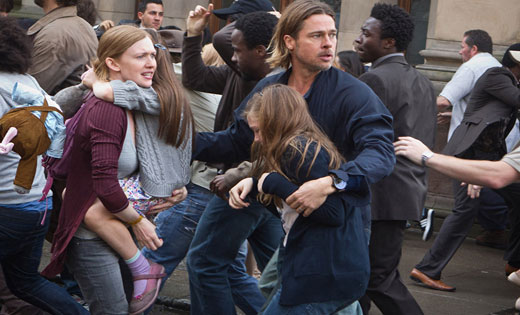
If you’re tired of hearing about zombies…that’s probably too bad. America’s most popular monster shows no sign of shambling away quietly. World War Z made almost half a billion dollars worldwide this summer and will make even more after the September DVD release; the undead have a serious profit margin.
Maybe this mainstream film success and the inevitable imitators will mean that the zombie hordes have crested. But don’t count on it. The fall premiere of the much-awaited fourth season of The Walking Dead, combined with the popularity of the graphic novels on which the series is based, ensures that the zombie will continue as our monster du jour for some time to come.
The popularity of the zombie in film, television, and print has made the undead horde the subject of plenty cultural wonkery. There’s basically a mountain of literature asking, “what do zombies really mean?” Last Halloween, a conference I took part in at the Emory University Center for Ethics pondered the zombie as a philosophical and even a theological problem.
World War Z deserves some special attention. Popular as they are, zombies have still been the preserve of genre writers and genre directors for a long time. But World War Z is a true mainstream movie, feeling often more like an action-adventure/disaster film than a horror flick.
Perhaps more importantly, its ideology barely stays beneath the surface where subtexts are supposed to live. This is true of most big, loud summer films that are trying to push as many of its audience’s buttons as they possibly can. It’s perhaps especially true of a film of this type that uses the zombie, a monster already packed with symbolism.
Some criticism has already appeared concerning Brad Pitt’s role in the film. He is portrayed as yet another male savior who protects the world by protecting his family and vice versa. But there’s another element to the film, an ideological element that American viewers are liable to miss. Pitt’s also protecting the one percent, almost literally. He and his family, because of his bizarre secret agent UN job, are largely safe, as the global proletariat becomes a spiraling mob of undead.
Much about the film taps into this idea. As Patricia Vieria has pointed out in an excellent critique of World War Z, the zombie storming of Jerusalem shows some similarities to images from various incarnations of the Palestinian Intifada. More to the point, much of the film’s creation of zombie uprising mis-en-scene looks a lot like street protests of all kinds, from Europe’s 1848 uprisings to 1917 to the contemporary Occupy movement.
There are other elements of the film that suggest that the great zombie war owes something to fears of a great global class war. Zombie films have, especially over the last decade and since Danny Boyle’s 28 Days Later, focused on the walking dead as representative of pandemics. World War Z does much the same, though makes the interesting move of locating the origins of the disease vector in Asia. In this, it follows the Max Brooks novel (one of the few places where the film proved faithful to its source material).
This origin story for the zombie menace taps into jingoistic western notions of the “clash of civilization.” Perhaps more significantly, it embodies more generalized fears of the developing world as representing billions of the poor waiting to move against the industrialized and modernized zones of safety in the west.
This uneasiness on the part of the western middle classes reflects some of the realities of the world we live in. The United Nations Millennium Declaration suggests that one billion human beings live in slum conditions the world over. The growth of urban populations and catastrophic concentrations of wealth are projected to lead to a slum population of six billion people by 2050.
Brad Pitt as the privileged male archetype struggling to save the world, and save his family’s lifestyle, reflects all the fears of the western middle class in the face of what will increasingly become untenable, and thus revolutionary, conditions. The summer’s zombie blockbuster suggests that the west may be fascinated with World War Z because what they really fear is World War Proletariat.
Photo: Official site

MOST POPULAR TODAY


Zionist organizations leading campaign to stop ceasefire resolutions in D.C. area

Communist Karol Cariola elected president of Chile’s legislature

High Court essentially bans demonstrations, freedom of assembly in Deep South

Afghanistan’s socialist years: The promising future killed off by U.S. imperialism






Comments